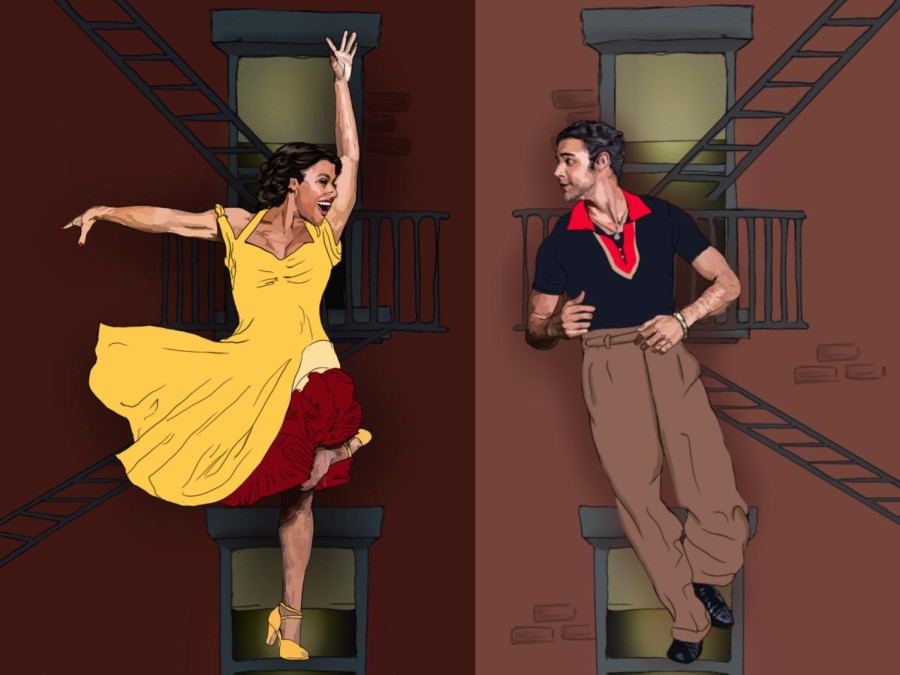The case against Steven Spielberg’s ‘West Side Story’
Hide your theater kids for this one.
(Illustration by Aaliya Luthra)
March 10, 2023
This Sunday, Steven Spielberg will return to the Oscars in recognition of “The Fabelmans,” his addition to the trend of wistful semi-autobiographical bombs like “Licorice Pizza” and “Once Upon a Time… in Hollywood.” It’s an entertaining enough film about film, an admittedly impressive feat considering its two-and-a-half-hour runtime. However, it is certainly one of the less interesting nominees at this year’s ceremony.
In light of this oversight, it would be prudent to revisit Spielberg’s remake of “West Side Story.” The film, like “The Fabelmans,” is built atop a nostalgic core that’s swindled him a ticket to the Oscars time and time again. In direct contrast to “The Fabelmans,” “West Side Story” is a film that deals with the problematic aspects of its time period, handling them in a way that is evocative of John Mulaney — that is, embarrassingly white.
“West Side Story” retells “Romeo and Juliet” with Tony (Ansel Elgort) and Maria (Rachel Zegler) as the titular main characters respectively. Spielberg reimagines the Montagues and Capulets as warring street gangs, the white Jets and Puerto Rican Sharks who brawl over control of the eponymous Upper West Side, hence the name. At its core, “West Side Story” is another story about racial strife written by straight, white men with a simplistic, moral message that only they could believe is satisfactory.
Although I dislike the original “Romeo and Juliet,” what Shakespeare understood is that by placing the Montagues and Capulets on roughly equal footing and obscuring their reasons for feuding, it becomes easier to depict their animosity as meaningless and destructive.
“West Side Story” introduces racism into the mix, making the Jets far more unlikable than the Sharks. The Jets constantly taunt the Sharks with racial remarks, vandalize their businesses and community, and even attempt to rape Anita (Ariana DeBose), the girlfriend of Shark leader Bernardo (David Alvarez).
In almost every instance of violence or harassment the Jets are the aggressors. This dynamic paints the Sharks as prey and the Jets as predators. For example, Tony — a Jet — begins the film recently released from prison, after almost beating a Shark to death in a street fight. But it’s okay because the film insists that he is a changed man, having apparently had his redemptive “American History X” moment while incarcerated. Though the fight in question is part of the film’s central feud between the Sharks and the Jets, it perfectly demonstrates how Spielberg’s reluctance to address the racism inherent to his source material results in the peddling of evermore egregious representations of white supremacist behavior.
If the film acknowledged its built-in racism, Spielberg’s adaptation might have proven a tad more successful. But after Tony is shot and killed at the end of the film, Maria angrily chastises both the Sharks and Jets, making a false, boneheaded equivalency, that registers as a decision only a group of white writers could have made.
It is absurd that we are expected to empathize with racists and attempted rapists. It is absurd that we are supposed to believe them to be just as bad as the racial minorities they terrorize. It is absurd that we are supposed to believe, accept and support a romance between the formerly racist Tony and Maria. Not to mention, the two characters had only known each other for two days and Tony murdered his new girlfriend’s brother.
Spielberg makes no successful effort to convince us why this affair would ever work. In his attempt to replicate the spectacle of the stage, Spielberg has opted for bright lights and drowning lens flares so obnoxious that you’d think J.J. Abrams was driving a Ford F-150 with high beams on in the background. Every light, even the colored lights, ends up hitting actors as white lights somehow, sterilizing the overall look of the film. This saps all intimacy from Tony and Maria’s relationship, taking it from the realm of the ridiculous to the grating.
It is unfortunate only superficial thought was given around how “West Side Story” should be retold 60 years later. The hand-me-down Hollywood politics that earned Spielberg the right to remake this classic musical meant no element of the story was rethought. Thus, all viewers were left with was a rehashed slice of racism.
Contact Andre Garcia at [email protected].



























































































































































